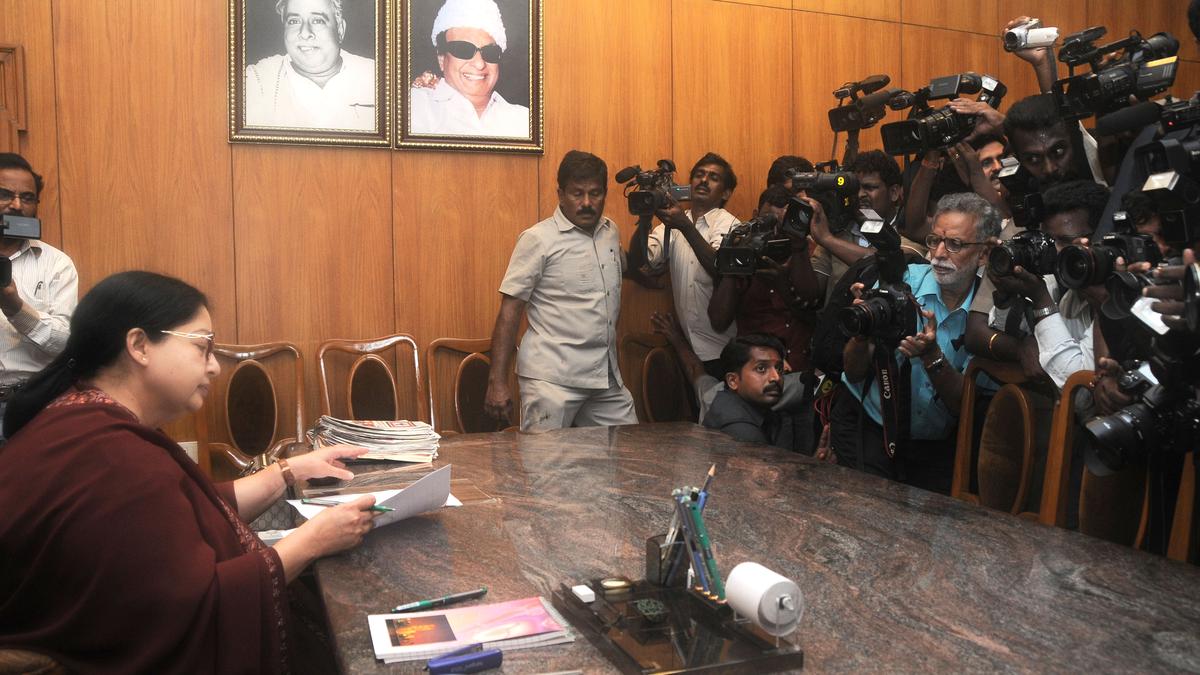
Chief Minister Jayalalithaa signs papers at Fort St. George in Chennai on May 16, 2011.
| Photo Credit: The Hindu
Recently, several prominent personalities paid tributes to former Tamil Nadu Chief Minister Jayalalithaa on her 77th birth anniversary. I had followed Jayalalithaa’s public life from the beginning. She, like me, was also once a resident of T. Nagar, a shopper’s paradise in Chennai.
Every observation and interaction yielded new discoveries. On May 16, 2011, when she was sworn in as Chief Minister for the third time, I saw how strongly she could express herself without saying a word. When I bent forward to give my visiting card to her at the Chief Minister’s chamber at Fort St George, the seat of the Tamil Nadu Legislative Assembly and Secretariat, a police constable tried to push me gently. The way she stared at the constable is still fresh in my memory.
However, in 2001, when Jayalalithaa returned to power, her equation with the media was anything but cordial. Her government began to file defamation cases against the press. By September 2003, her establishment had filed 15 defamation complaints against The Hindu, apart from having initiated breach of privilege proceedings in the Assembly against the newspaper for three reports and an editorial titled ‘Rising intolerance’.
Back then, I had done some research and calls for a story that I thought was harmless. The story was about the Tamil Nadu government’s decision to construct a check dam to augment water supply to Chennai. Tamil Nadu, like many other parts of the country, was reeling under a long spell of acute water shortage. Chennai, which largely depends on rainfall to quench its thirst, was affected badly. Any news report on water caught public attention then, as it invariably appeared on the front page. My story, too, appeared on page 1 of The Hindu on July 26, 2001.
But Jayalalithaa had a different opinion. Her objection was not to the core part of the story, but to the penultimate para, which said that she would meet Andhra Pradesh Chief Minister N. Chandrababu Naidu in Hyderabad on August 3 to seek more Krishna water, which had become an important source for Chennai from 1996.
I didn’t know this until the next day when, at around 8 a.m., I received a call on my landline at home from an IAS officer, who told me to be prepared to receive a call from another officer attached to the Chief Minister’s Office (CMO). The other officer came on the line. Speaking in a soft tone, he broached the matter regarding the Chief Minister’s proposed visit to Hyderabad and asked me to reveal my source. I was stumped. The officer added that only a few people knew about her trip. I replied to him that he, being the representative of an “all-mighty government”, was wasting his time and energy by talking to a “lowly mortal.” He abruptly cut the call. I told the Chief of the News Bureau, V. Jayanth, about the call.
Later that day, the CMO issued a statement denying that Jayalalithaa would meet Mr. Naidu on August 3. It added that in the event of such a trip being planned, the news would be given to everyone. It became clear to me that Jayalalithaa first wanted to make public any “positive news” about her or her government’s measures. When Mr. Jayanth came across the press release, he thought of mentioning in the copy about the CMO’s denial, the conversation that I had had with the officer from the CMO. However, on second thoughts, he dropped it, unwilling to precipitate matters.
My source remained in the position for more than two years. The officer who called me also stayed at the CMO for two years. While I always remembered the episode, forever smarting from the fact that I had been asked to reveal my source, he had forgotten about it. I met him in 2013 at a public function and reminded him about the call. When his turn came that day to give a talk, he welcomed me and even referred to the phone conversation. Jayalalithaa was still in power at that time.
Published – March 07, 2025 01:05 am IST
